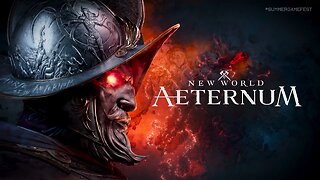Premium Only Content

Materiality and Spirituality in the Hypostasis of the Archons
Read full article here:
https://spiritualseek.online/blog/materiality-and-spirituality-in-the-hypostasis-of-the-archons/
------------------------
Some Meaningful Quotes From the Hypostasis of the Archons
The Archons are the powers of the world.
This quote identifies the Archons as governing forces in the material world. They are often seen as obstacles to spiritual enlightenment, representing the limitations imposed by societal structures and material existence.
They do not know that they are not the ultimate reality.
This statement suggests that the Archons lack understanding of their true nature and role. Their ignorance of a higher reality leads to oppression and the perpetuation of worldly suffering, indicating that true knowledge transcends their authority.
The true man is a stranger to the material world.
This quote reinforces the idea that genuine identity and essence lie beyond physical existence. It implies that individuals should seek to understand their spiritual nature rather than being defined by worldly ties and material desires.
The light that is within you can guide you past the Archons.
This line emphasizes the presence of an inner divine spark or light that can lead individuals to liberation from the Archons’ influence. It encourages reliance on inner wisdom and spiritual insight for personal empowerment and freedom.
The world is a prison for those who do not know themselves.
This statement underscores the importance of self-knowledge. It suggests that a lack of understanding of one’s true self can lead to a life bound by the limitations of the material world, perpetuating a cycle of ignorance and suffering.
------------------------
Excerpt from the original article
Introduction to the Hypostasis of the Archons
The Hypostasis of the Archons, also known as “The Reality of the Rulers”, is a Gnostic text that provides profound insights into the philosophical and spiritual dimensions of Gnosticism. Discovered in 1945 as part of the Nag Hammadi Library, it presents a unique cosmology that differs significantly from orthodox religious narratives, especially those found in Christian, Jewish and Islamic traditions.
Philosophical and Spiritual Aspects
At its core, the Hypostasis of the Archons explores themes of dualism, divine knowledge (gnosis), and the nature of reality. The text describes a cosmic struggle between the true God and a group of malevolent beings known as the Archons—rulers or authorities who govern the material world. These Archons are depicted as ignorant and blind, having created a flawed physical realm that traps human souls.
One notable passage states: They [the Archons] do not know their own origin (Nag Hammadi Library). This quote encapsulates a central tenet of Gnostic thought: the ignorance of these rulers reflects their separation from the divine source. In contrast to traditional religious views that often portray God as omniscient and benevolent, Gnostic texts like this one suggest that many deities are flawed or misguided.
The text further elaborates on the concept of Sophia (Wisdom), which plays a pivotal role in Gnostic cosmology. Sophia’s desire to know the ultimate God leads to her fall into ignorance and her subsequent creation of the material world alongside the Archons. This narrative emphasizes a critical philosophical insight: knowledge is both liberating and perilous. The pursuit of gnosis—spiritual enlightenment—is seen as essential for transcending the limitations imposed by these rulers.
Influences on Gnostic Tradition
The Hypostasis of the Archons significantly influences Gnostic philosophy by reinforcing key beliefs such as dualism—the idea that there exists a fundamental opposition between spirit and matter—and anti-materialism. Unlike mainstream Christianity, which often embraces creation as fundamentally good, Gnosticism posits that material existence is inherently flawed or evil due to its association with ignorance and oppression.
Moreover, this text contributes to understanding salvation within Gnosticism. Salvation is achieved through self-knowledge and recognition of one’s divine spark trapped within an imperfect body. The emphasis on personal experience over institutional authority marks a departure from orthodox teachings where salvation is mediated through faith in Christ or adherence to religious laws.
Unique Features Compared to Other Gnostic Texts
What sets Hypostasis of the Archons apart from other Gnostic writings is its vivid portrayal of cosmic conflict between light and darkness through mythological narratives rather than abstract philosophical discourse alone. While texts like “The Gospel of Thomas” focus more on sayings attributed to Jesus emphasizing inner wisdom, Hypostasis provides an elaborate mythos detailing how humanity became ensnared in materiality.
-
 23:46
23:46
barstoolsports
2 hours agoSurviving Barstool Drama Spills Over Into The Office | Stool Scenes
3.88K1 -
 LIVE
LIVE
Shield_PR_Gaming
3 hours ago01/18/25. Let's chill with MMORPG and then some shooters!! Read Description! You know you want to!!
502 watching -
 1:09:39
1:09:39
Tactical Advisor
2 hours agoTrump Inauguration & New Gun Releases | Vault Room Live Stream 014
11.7K1 -
 11:27
11:27
Adam Does Movies
15 hours ago $5.06 earnedWolf Man Movie Review - Does It Bite?
39.8K6 -
 11:57
11:57
inspirePlay
19 hours ago $7.33 earnedLongest Drive Wins! Elite Long Drivers Battle in Par 4 Elimination
54.3K6 -
 8:44
8:44
RTT: Guns & Gear
21 hours ago $4.10 earnedStreamlight TLR RM2 Laser - G | The Best PCC Light
36.2K1 -
 36:38
36:38
Athlete & Artist Show
1 month ago $2.75 earnedNCAA Hockey Was A Joke, TNT Hockey Panel Is The Best In Sports
31.5K2 -
 1:00:08
1:00:08
Trumpet Daily
1 day ago $5.33 earnedBanning Mystery of the Ages - Trumpet Daily | Jan. 17, 2025
20.4K18 -
 15:10
15:10
Chris From The 740
1 day ago $2.91 earnedEAA Girsan Disruptor X 500-Round Review: Is It Reliable?
37K4 -
 1:00:38
1:00:38
PMG
18 hours ago $5.53 earnedCarnivore & Dr. Shawn Baker - Health Starts With Food
53K4